Best Creatine Supplements of 2021

Creatine is a naturally occurring substance that, when used in supplement form, enables people to enjoy more effective workouts and better overall health.
Creatine has been known and studied for more than two centuries, yet it is only in recent years that it has found widespread favor among the fitness-conscious.
But that is not to say creatine is only for bodybuilders. More and more studies are revealing the important role creatine plays in brain function, blood glucose management and much more.
The following are the best creatine supplements of 2021.
1. MuscleTech Platinum Creatine
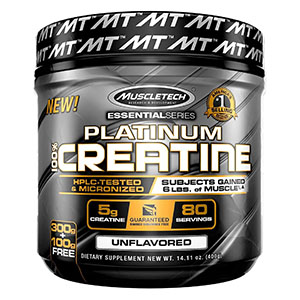
MuscleTech Platinum is perhaps the best selling creatine supplement on the market. And for a lot of good reasons. It is pure creatine monohydrate that is completely free of artificial ingredients and additives. It’s also affordable, at less than 20 cents per serving on average. And it has the added benefit of being vegan-friendly.
Another big plus is that MuscleTech Platinum Creatine is flavorless. That means you can mix it with anything without worrying that it will spoil the flavor or create a nasty flavor combo. As a bit of icing on the cake the MuscleTech website provides up to date info on how to put their products to optimal use by way of workout videos and more. And the 30-day money back guarantee is nice too.
2. Optimum Nutrition Micronized Creatine
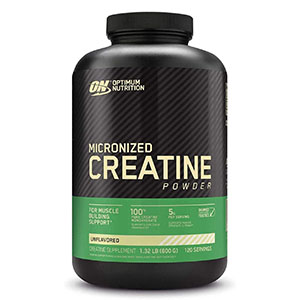
Optimum Nutrition is another big name in workout supplements and their Micronized Creatine is a good example of why. Micronized simply means the particles have been reduced in size to such a degree that they are measured in microns. Those tiny particles blend easier with your chosen beverage and make the whole process of consuming creatine much more pleasant.
Optimum Nutrition Micronized Creatine is pure, unflavored creatine monohydrate. It contains no artificial ingredients, and just 5 grams per day will set you on a path to better overall health. It is also entirely free of banned substances that might get you in trouble with your sports’ governing body. All Optimum Nutrition supplements are produced in a Good Manufacturing Practices (GMP) facility in the US
3. Naked Nutrition Pure Creatine Monohydrate
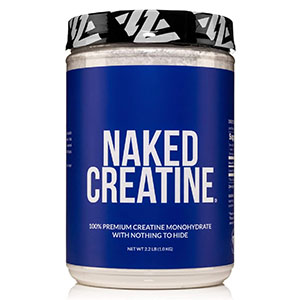
Naked Nutrition does not have the name recognition of the first two entries on this list but their Pure Creatine Monohydrate is a value winner. Each 5 gram serving costs about a dime, and there are 200 servings in one affordable tub. But NN creatine is not just affordable, it’s also highly pure, contains no genetically modified organisms (GMOs), is free of common food allergens like soy and gluten, and is certified vegan.
As if that is not enough, it is also micronized so it blends easily with your favorite beverage, and it is unflavored and free of sweeteners whether natural or artificial. So go ahead and mix it with your juice, coffee, or just plain water.
4. NOW Sports Creatine Monohydrate
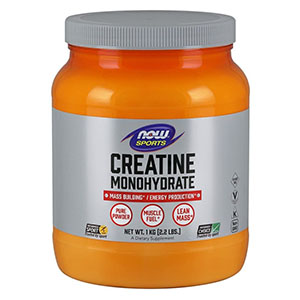
NOW is best known for their vitamin and mineral supplements. But here they flex their muscles in the creatine space with their pure Creatine Monohydrate powder. NOW has been producing safe and effective supplements for more than 50 years and their creatine powder is another nice addition to their already formidable lineup.
There are no GMOs in this creatine, no artificial flavors or sweeteners, and no banned substances. The company understands that is a major concern for many athletes, and so they submit their creatine to rigorous third-party testing so that you can rest easy. NOW is a family owned business, with all their supplements produced in a GMP facility under the watchful eye of the FDA.
5. Promera CON-CRET Creatine HCL Powder
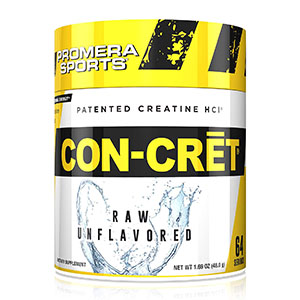
Promera takes a slightly different approach to creatine supplementation with their Con-Cret Creatine HCL Powder. ‘HCL’ stands for ‘creatine hydrochloride’ which is a type of creatine that is more easily soluble than standard creatine powders. The implications are that A) it will blend easier and more completely with your chosen beverage, and B) you will not need to use as much.
It should be said that the scientific jury is still out on point B. But that does not mean this powder does not have its strengths. It certainly does. First of all, it is easier to mix than many others. It is also completely free of artificial additives, preservatives and flavors. And it is free of GMOs and common food allergens like gluten.
6. MP Essentials Micronized Creatine
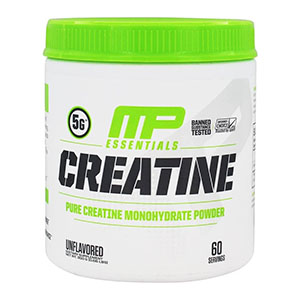
MP Essentials Micronized Creatine is comprised of incredibly fine particles that blend easily with your preferred beverage. Lots of people prefer it over standard creatine powder for that reason alone. But MP’s Micronized Creatine has more going for it than its smooth, agreeable nature. It is also potent and pure, completely free of banned substances, and contains no artificial sweeteners, flavors, colors, or preservatives.
This unflavored creatine powder is perfect for those tired of finding a layer of undissolved creatine at the bottom of their glass. Its mixability is unmatched and there are no flavor additives to clash with your chosen beverage. MP Essentials operate a GMP facility in the US where they produce this and all their other supplements.
7. Bulk Supplements Creatine Monohydrate
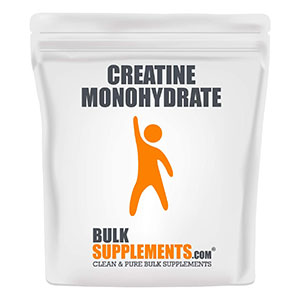
Bulk Supplements have made quite a name for themselves by providing high-quality dietary supplements in the simplest possible packaging. That basic packaging is where they save on production costs. They then pass those savings on to the customer. It’s a good idea and it has enabled the company to build a large, dedicated customer base.
In spite fo the minimalist packaging, their Creatine Monohydrate is every bit the equal of the other products on our list. It is free of artificial flavors, colors, sweeteners and preservatives. And it is subjected to rigorous third party testing. That third party testing ensures purity, but also ensures it is free of banned substances.
8. Met-Rx Creatine 4200
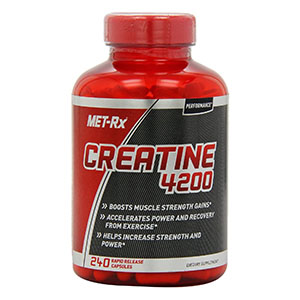
Not everyone is fond of the idea of drinking a creatine shake every day. Or mixing a scoop of creatine powder with their coffee. They want something more convenient that enables them to enjoy their normal beverages the way they were intended. For those folks there’s Met-Rx Creatine 4200.
These easy to swallow capsules contain the same pure creatine monohydrate you will find in powders, but require a lot less labor. If there is a downside here it’s that you will need to take 6 of these, either all at once or spread out over the day, to get your full daily dose of creatine. Still, they go down easy and each capsule costs only pennies.
9. BSN Micronized Creatine Monohydrate Powder
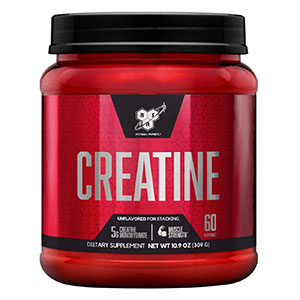
BSN Micronized Creatine Monohydrate Powder blends effortlessly with whatever non-carbonated beverage you have in mind. And because it is unflavored it will not interfere with the taste of your coffee, juice or whatever. Each 5 gram serving contains ultra-fine creatine monohydrate powder that will enable you to optimize your workouts, stabilize blood glucose levels and enhance overall health.
BSN creatine is highly-rated by users and contains no artificial flavors, preservatives, or sweeteners, and no genetically modified organisms. BSN has been in business for more than a decade and operates an FDA-certified GMP facility in the US.
10. Cellucor Cor-Performance Creatine Monohydrate
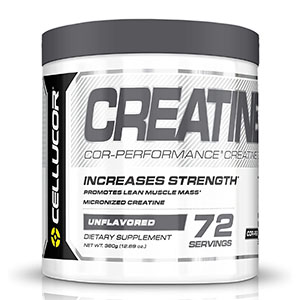
The final creatine supplement on our list is from Cellucor. One tub of their Cor-Performance Creatine Monohydrate provides 72 servings of pure creatine monohydrate and nothing else. Cor-Performance creatine is micronized to aid in solubility and digestion and contains no food allergens like gluten or soy, no sugar or artificial sweeteners, and no banned substances of any kind.
Cor-Performance Creatine Monohydrate is a good value that enables you to achieve optimal results from your workouts without breaking your bank. It is produced in a Good Manufacturing Practices facility in the US under FDA supervision.
FAQs
What Is Creatine?
Creatine is a natural compound composed of the amino acids arginine, glycine and methionine. Creatine is produced by the liver with most of it being stored in muscle tissue, although there is also a significant reservoir of creatine in the human brain.
Creatine serves many purposes in the body, but most people are interested in it for its ability to enhance energy levels and increase workout effectiveness. It does this by facilitating the production of adenosine triphosphate, or ATP (1), which governs the production of energy in our cells.
Creatine has been known and studied for more than 200 years and, when taken in moderation, has never shown the slightest indication of being dangerous to humans. In recent years, its cognitive, metabolic and other benefits have also come to the fore. As a result, it may wind up being considered one of the most important, beneficial natural supplements a person can take.
What are the Benefits of Creatine?
Creatine helps build muscle mass – This is the number 1 reason people use creatine and it does not disappoint. Just keep in mind that no supplement is going to increase muscle mass on its own. You have to do your part by exercising. But if you do, the muscle gains you will see with creatine (2) will be greater than what you would see without it.
Creatine helps you get more from the muscles you have – When you take a creatine supplement you increase the amount of phosphocreatine stored in your muscles. This is important because phosphocreatine (3) is vital to the production of ATP, which muscle cells use to generate energy. So by taking creatine supplements you enable your body to get enhanced performance out of the muscles you have. This, in turn, enhances the efficiency of your workouts.
Creatine can help reduce fatigue – Having greater amounts of phosphocreatine stored in your muscles also reduces the likelihood of fatigue. Even those who may not be getting adequate amounts of sleep will experience less fatigue if they supplement their diet with creatine (4), and engage in only modest exercise.
Creatine is good for your brain – While this is not a benefit of creatine supplementation that gets a lot of press, it is nonetheless real. Researchers have learned that the ATP produced by phosphocreatine is also an important fuel for our brains (5). And creatine supplements are the fastest way to generate more ATP. So, if you want to stay mentally sharp, consider creatine.
Creatine may help those with Parkinson’s – While studies so far have concentrated on mice, those studies nonetheless suggest that creatine supplementation can help improve dopamine (6) levels in the brain. Since one of the characteristics of Parkinson’s is lower brain dopamine levels, this research suggests creatine supplementation may play a role in future Parkinson’s therapy (7).
Creatine helps you get more from your workouts – If you are a fan of high intensity exercise it may please you to learn that creatine supplementation can likely improve your performance and enhance the benefits of your HITT workouts (8). These benefits will be felt across that entire range of performance metrics, including fast twitch muscle performance, ballistic power, endurance, recovery time and muscle mass increase.
Creatine may help reduce the risk of diabetes – Creatine cannot increase insulin sensitivity, but studies suggest it may improve glucose tolerance. Glucose tolerance is roughly defined as the body’s ability (or inability) to handle a glucose load like that which typically occurs after eating. If the body is unable to tolerate glucose effectively, it increases the risk of diabetes. Studies suggest that creatine and exercise can improve glucose tolerance (9).
Creatine is safe and effective – In addition to its many physiological benefits, creatine is also considered both safe and effective. Creatine has been known to science for some two centuries. In all that time, none of the countless studies conducted on its mechanisms and effects have raised any red flags regarding safety.
Are There Different Kinds of Creatine?
There are a half dozen types of creatine, but only a few are actually used in dietary supplements. Those are:
Creatine monohydrate – Without a doubt creatine monohydrate is the most popular form of creatine when it comes to dietary supplements. It is also the type of creatine molecule that has undergone the most scientific testing (10). The ‘monohydrate’ in the name indicates that the creatine molecule has been paired with a water molecule.
Creatine hydrochloride (hcl) – The second most popular form of creatine used for dietary supplements is creatine hydrochloride or hcl. Creatine hcl received a lot of favorable press when it first hit the supplement market because of its superior solubility (11) over creatine monohydrate. It was believed that this meant you could achieve similar results using less creatine. However, it should be noted that there have been no studies conducted to confirm or refute these claims. So as of this writing, it is still speculation.
Creatine magnesium chelate – In the broadest sense, chelation is the process of bonding molecules together (12). Some supplement makers use chelation to combine creatine with magnesium. The goal is to enable greater endurance and produce bigger muscles. There are many bodybuilders who swear creatine magnesium chelate will do just that. However, there is no scientific evidence to back up this claim.
Powder or capsule? – Most creatine supplements take the form of a powder that is mixed with a non-carbonated beverage. Some people take creatine this way every day, while others only indulge in a creatine drink or shake prior to working out. Less popular are creatine capsules. They retain a relatively small but devoted following among people who do not want to be bothered mixing creatine into their beverages or making creatine shakes.
Does Creatine Cause Dehydration?
No. There is no scientific evidence to support the oft-repeated notion that creatine causes dehydration or cramping (13). Muscle cramps are typically caused by a lack of hydration. Creatine increases the amount of water retained by the muscles. So, if anything, taking creatine should reduce the number of cramps a person experiences.
However, (and this is likely where some people get in trouble), the fact that creatine causes muscles to retain water does not mean you can stop drinking as much water as you used to when working out. You must continue to drink as much water as you usually do. Otherwise, creatine or no creatine, you are asking for cramps.
Can I Mix Creatine With My Pre-Workout Coffee?
You can and many people do mix creatine with either their morning coffee or with a cup of coffee in the time leading up to their workout. It is a potent combination in that the caffeine gets you going and the creatine ensures you keep going and are able to push your performance to new heights.
If there is a downside, it’s that some folks claim the combination produces heartburn. While others say it upsets their stomach. Other than that, there is nothing stopping you from adding creatine to your coffee.
Are There Side Effects to Taking Creatine?
The FDA considers creatine a dietary supplement. And a pretty harmless one at that, when it is taken as directed. Numerous studies have been conducted that support that claim (14). If the FDA believed, or even suspected, that it had serious adverse side effects it would be pulled from the market. The fact that they have not done that should be reassuring.
That said, too much of anything (even food or water) can produce negative side effects and creatine is no different. Some people who take large amounts on a daily basis may experience water weight gain. It is also possible that ignoring the recommended dosage and loading up on creatine may lead to bloating, muscle cramps, kidney damage or digestive issues.
Is Creatine a Type of Steroid?
This is a common question and we are glad to say the answer is “No”. Creatine is not a steroid. Steroids are Schedule III Controlled Substances (15) which, as far as the FDA and DEA are concerned, have few if any redeeming values, are potentially addictive, and have numerous side effects, some of them serious.
Creatine on the other hand, is a dietary supplement. The government has no particular concerns about its safety. The only FDA regulations pertaining to creatine have to do with ensuring the facility where it is produced adheres to the agency’s Good Manufacturing Practices, or GMP (16), guidelines.
Do I Need to Take Creatine Every Day?
It is up to you. Some people take it only on workout days. Others take creatine every day, workout or no workout, in order to ensure there is plenty on hand when they do workout. While there is copious clinical data to support the notion that creatine can help build stronger muscles and greater endurance, there have been almost no studies done on whether daily or intermittent dosing is best. In lieu of such evidence, it is probably best to try both methods and see what works best for you.
Is it Necessary to do Creatine Loading?
Some believe that if you load up on creatine for a week or two when you first start, before dialing back your daily intake, it will help jump start the benefits. However, there is no evidence to support this idea. The evidence actually suggests just the opposite; that supplementing with a modest amount from the beginning should produce all the muscle building benefits you are after.
Are Creatine Capsules a Waste of Money?
Not at all. Creatine capsules contain the same creatine you will find in creatine powders. In most cases that means creatine monohydrate. But it might also mean creatine hcl. Capsules are actually a convenient way to get the creatine you need to enhance your workouts. The only real concern is that you may under-dose yourself because you will need to take several capsules to match the amount of creatine you would get in a single creatine shake. Other than that, there is no difference between powder and capsules.
The Bottom Line
Until recently, not many people (other than bodybuilders) had ever heard of creatine. Fewer still were the people who fully understood its potential benefits. Today, however, creatine is finally getting the recognition it deserves as a first-rate workout supplement, and as a potential way to help fend off diabetes, Parkinson’s and other debilitating conditions.
If you are looking for an affordable, simple, and effective way to get more from your workouts you owe it to yourself to consider one of the fine creatine supplements on the above list. Each is produced by a reputable company under supervision of the FDA. And each has proven its ability to provide the above-listed benefits when used as directed.

